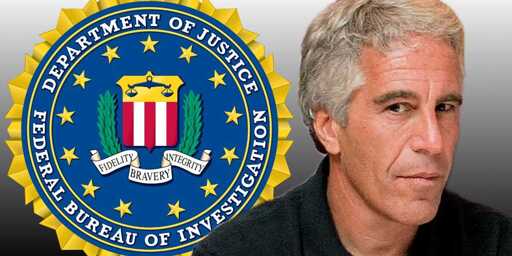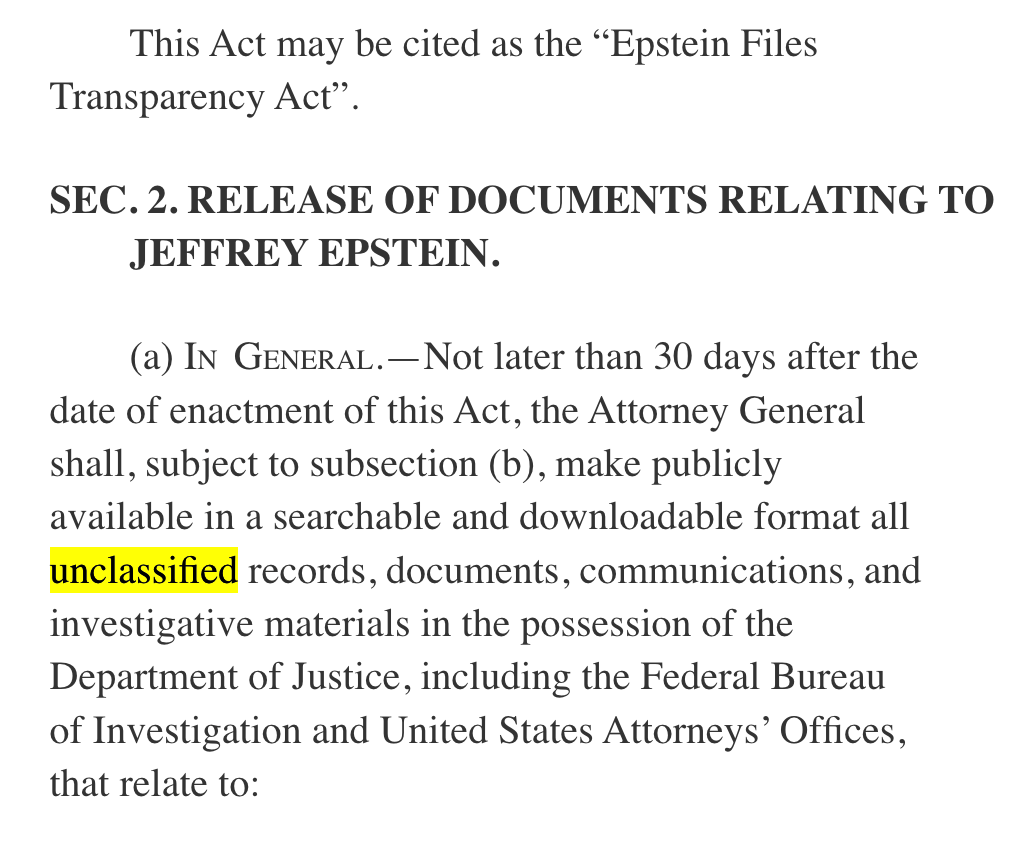When Congress votes tomorrow on a bill many think will pry loose the Jeffrey Epstein files, one glaring loophole will prevent full transparency. It’s called national security.
Not national security that has anything to do with the national defense or harm to the nation, but the self-serving kind that protects the system from the people by depriving them of information — in this case about Jeffrey Epstein, his 1,000+ victims according to the government, and any accomplices he had. With 89 percent of Americans in agreement that the Justice Department should release all information about Epstein(!), the message is clear: national security is more important than democracy.
Take a look at Congress’ long-shot attempt to force the release of the government’s records, led by Reps. Ro Khanna and Thomas Massie. A seemingly innocuous word appears in the resolution: “unclassified.”
Screenshot of Epstein Files Transparency Act
It is an official word that in theory only exists when it comes to national security matters; that is, that the release of such information could cause “harm” to the national security. (There is, of course, a small chance that some FBI methods relating to intelligence collection might officially qualify as “classified” because the release might expose certain capabilities of the government, but even there, I’d argue that the public has a right to know.)
And yet somehow the word made its way into the Epstein Files Transparency Act.
It’s the wrong word. The bill, after demanding that “No record shall be withheld, delayed or redacted on the basis of embarrassment, reputational harm, or political sensitivity, including to any government official, public figure, or foreign dignitary,” goes on to undermine all of that.
The bill says that if the Attorney General “makes a determination that covered information may not be declassified and made available in a manner that protects the national security of the United States, including methods or sources related to national security, the Attorney General shall release an unclassified summary for each of the redacted or withheld classified information.” As in, the Attorney General would get to decide what to release and how to characterize it.
What?
Asked what their rationale was for including the “unclassified” word, neither Khanna nor Massie responded to a request for comment as of publication. It’s entirely possible that they (or their staffers and lawyers) didn’t even think about whether there were alternatives to using the language of national security, but it is more likely that the Justice and FBI liaison officers on the Hill helped craft acceptable language.
Asked by independent journalist Michael Tracey about a similar carveout for “national defense” information in earlier legislation back in September, Massie’s reply was basically that he had no choice.
Massie said:
“You have to put that in there if you’re going to get them to sign it … It’s not something I would sit and say, let’s put that in there. It’s something that, when you run the bill past other colleagues and say, ‘Can you sign this? In fact, can you get every Democrat to sign it?’ It’s one of the things that was felt was necessary to put in there.”
It all sounds procedural, but the resolution consequently falls prey to the national security doctrine that seems to be infecting every corner of American life. And Massie’s explanation gives a sense of how reflexively officials show deference to the logic of national security.
The truth is that the rich and powerful (including the FBI) are ultimately going to be protected from those who are clamoring for change. They aren’t hiding behind national security. They are national security.
The Epstein files released by the House Oversight Committee last week are dwarfed by the Justice Department and FBI’s over 300 gigabytes of information they say they’ve amassed from their review of all of their internal Epstein-related materials. Earlier this year, Attorney General Pam Bondi and FBI Director Kash Patel said that their agencies had completed an “exhaustive review” of its holdings, an effort that reportedly involved over 1,000 FBI agents.
The Justice Department alluded to the sheer size of the effort in a press release, saying:
“Teams of agents, analysts, attorneys, and privacy and civil liberties experts combed through the digital and documentary evidence with the aim of providing as much information as possible to the public while simultaneously protecting victims.”
But they ended up releasing none of it. When pressed to explain why, Kash Patel gave the laughable excuse that “We’re not gonna re-victimize women.”
Though the 50-year-old Freedom of Information Act states that the federal government can’t withhold data from the public merely because it is embarrassing, in a 2021 lawsuit still pending where attorney Dan Novack sued for Epstein records, the FBI rattled off a long list of information it says it has but cannot disclose. That includes:
“Names, Identifying Data and/or Information Provided by Individuals Under an Implied Assurance of Confidentiality”
“Names, Identifying Data and/or Information Provided by Individuals Under an Express Assurance of Confidentiality”
“Names and/or Identifying Information of Third Parties who Provided Information”
“Names and/or Identifying Information of Third Parties of Investigative Interest”
“Names and/or Identifying Information of FBI Special Agents”
“Foreign Government Agency Information Under Implied Confidentiality”
“Dates/Types of Investigations”
“Collection/Analysis of Information”
“Names and/or Identifying Information of Non-FBI Federal Government Personnel
“Name and/or Identifying Information of Local Government Personnel”
“Information Regarding Targets, Dates, and Scope of Surveillance”
The absurd lack of transparency by the government is a big reason for the prevalence of conspiracy theories. When the government is hiding something, people are naturally going to assume the worst.
Congress’ House Oversight Committee has had the most successful effort so far to force transparency, releasing some 20,000 pages of Epstein documents last week, largely records subpoenaed from Epstein’s estate. Yet here too lurks the specter of national security. The Oversight Committee was originally founded in 1927 for the purpose of overseeing the executive branch. But in 1991, Congress passed a law that gave up its power to oversee parts relating to national security.
“In rare circumstances, Congress has chosen to enact laws that limit its own ability to access specific types of information,” the Congressional Oversight Manual says. The manual adds that “commonly cited statutory restrictions on oversight…relate to foreign intelligence activities.”
Though Congress has generally interpreted executive privilege narrowly, national security is the big exception to that. It’s as if President Trump, or any president for that matter, has a panic button labeled national security.
Attorney General Pam Bondi explained back in March why the Epstein Files won’t be released. Asked by Fox News host Sean Hannity if anything besides victim information might need to be redacted, Bondi replied: “Of course, national security.”
Of course.
And so the word “unclassified” slipped into the resolution and nobody even questions the implications of including a national security term where it has no place. National security has become the dark matter of government: a substance that is everywhere around us and yet scarcely visible to anyone.
This newsletter is 100% reader-funded. We take no corporate money and as a result, rely entirely on you to survive. To receive new posts and support my work, consider becoming a free or paid subscriber.
— Edited by William M. Arkin
From Ken Klippenstein via this RSS feed




